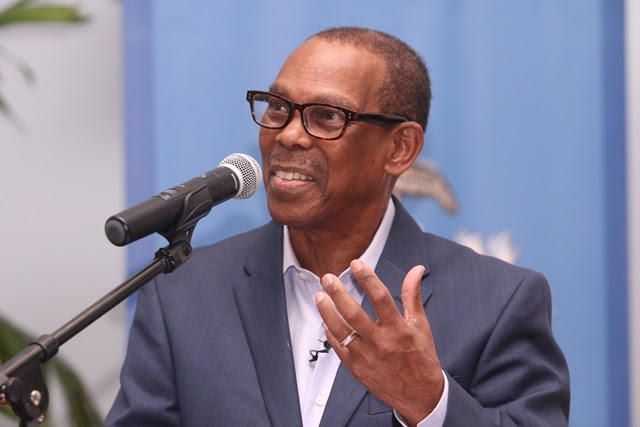Inaction on Climate Change could lead to enormous costs for the Caribbean.
(CARICOM Secretariat, Turkeyen, Greater Georgetown, Guyana) Unless bold steps are taken now to eliminate the risks from Climate Change “future generations are in big trouble and for the Caribbean the trouble is massive “.
This is the warning given by UWI Professor Emeritus and former Assistant Secretary General for Human and Social Development, CARICOM Secretariat, Dr. Edward Greene, to a large audience at the UWI Distinguished Open Lecture at the UWI, St Augustine on 21 June 2016.
In his presentation entitled, Climate Change: The Future of the Caribbean, Dr. Greene referred to the Paris Agreement, ratified by 192 nations of the UN, as a landmark declaration aimed at keeping global warming below 2 degree Celsius. According to him, “for the first time there was a global commitment to pursue efforts to limit temperature increases to 1.5 degrees Celsius”.
Tracing the journey to Paris, Dr. Greene commended CARICOM and the leadership of the Caribbean Community Climate Change Centre (5Cs) for the campaign 1.5 to stay alive, initiated in 2009 ahead of the UN Conference on Climate Change in Copenhagen – “the CARICOM Campaign is to be celebrated” he said.
Noting that the objectives of the Paris Agreement requires multi-sectoral action, he illustrated their linkages with many of the sustainable development goals, especially those related to: food, nutrition and sustainable agriculture; gender equality and empowerment of women and girls; access to affordable and clean energy; and ensuring healthy lives and promoting wellbeing for all ages.
Dr Greene who chaired the CARICOM Steering Committee on Climate Change during the period 2008-2010, pointed out that the implementation of the agreed CARICOM Plan for climate resilience is a step that could catalyze the Region’s integration movement; but that it required game changers. In this regard he identified the special role of the Universities and other institutions of higher education; making functional cooperation pivotal to the climate change enterprise; investing in the renewable energy sector; engaging schools and communities; and involving the people, civil society, in climate decisions and actions as priorities.
He also pointed to the need for overcoming the challenges and the gaps to be addressed by the Region, which he identified as including insufficient development of climate impact models, inadequate early warning systems, insufficient venerability studies and inadequate technical, institutional and financial capacity. But Dr. Greene is worried “that rampant nationalism stands in the way of a viable Caribbean Community that is a prerequisite to deliver on the priorities of climate change “.
The sourcing of adequate financial resources to fund activities for climate adaption and mitigation and for risk reduction was deemed equally important by the former Assistant Secretary-General. Drawing on a series of studies, he concluded that by 2050, the overall cost of inaction will revolve around losses and damages for the Caribbean, in absolute terms estimated to a total of US $22Billion annually or 10 percent of GDP.
He called on the University if the West Indies to seriously consider a Consortium Graduate School for Sustainable Development in the Caribbean and on CARICOM to establish a Commission of Caribbean Community Climate Change Implementers.
“I believe that the Climate Change agenda and the bold actions we must take provide a golden opportunity for the revival and strengthening of the regional movement and for the sustainable future of the Caribbean” he concluded.






